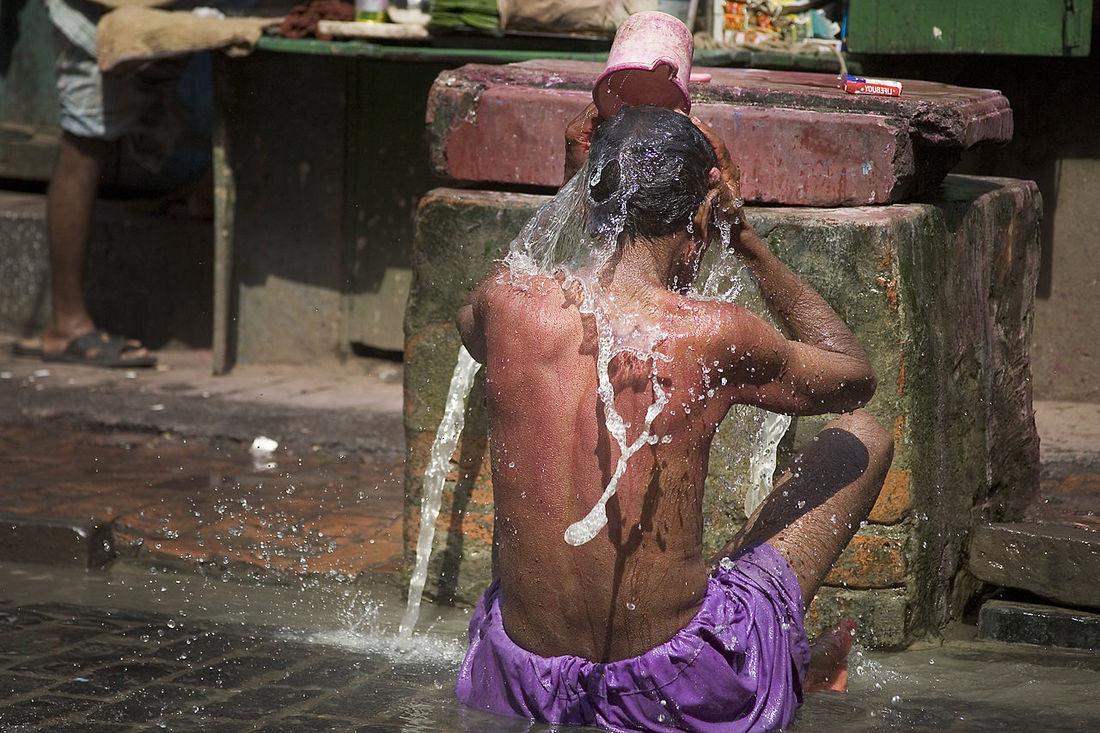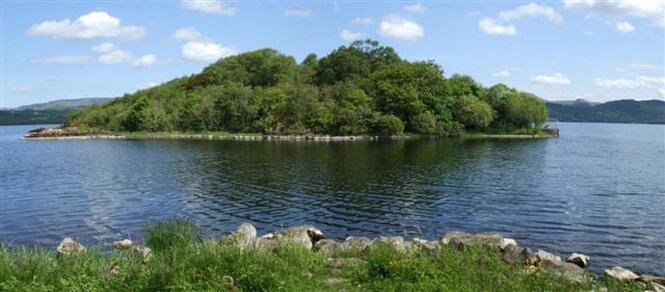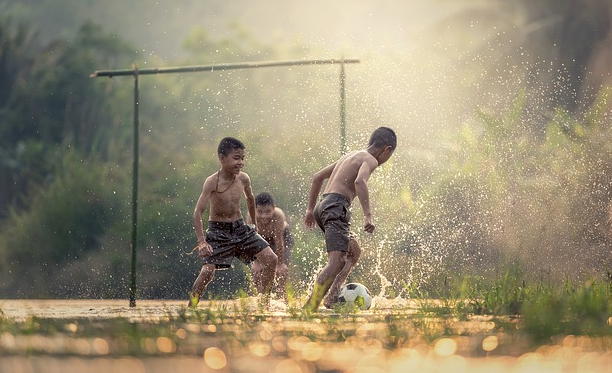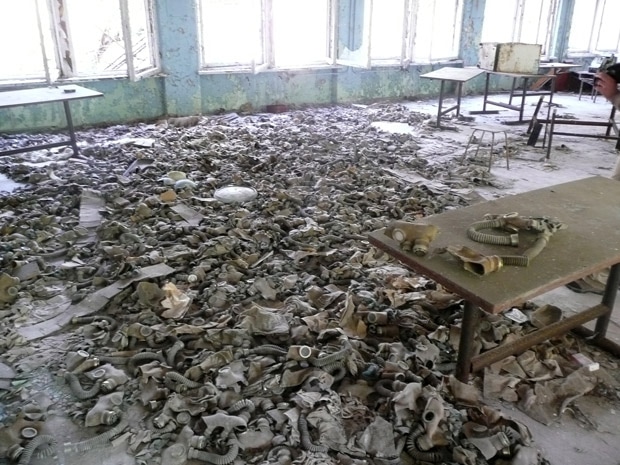 ‘Blessing’ by Imtiaz Dharker Carol Ann Duffy has stated that ‘poetry is the music of being human’. Given that much of what it means to be human revolves around water - where we live, how we live, whether we live - it is no surprise that water can provide such rich inspiration for poetry. Just as the rain lends movement and vitality to the scene described in ‘Football, Kuala Lumpur’, Imtiaz Dharker’s ‘Blessing’ provides a moving description of the joyful celebration inspired by water’s unexpected arrival. When studying this poem with children, there is a great deal of mileage to be had in discussing how the poet conveys the huge importance of water, when it is considered in the context of poverty. ‘There is never enough water’ not only because the place described happens to be a hot country, but because access to whatever water there is is limited by circumstance. In this Mumbai slum, there is no running water within each individual dwelling, so the residents must go to collect water as per their daily requirements. For many, this will involve walking a significant distance, will require considerable effort and will be hugely time-consuming. “Why don’t the people just break the pipe to get at the water?” the Year 7 children with whom I typically use this poem will often ask in the thick of our discussions. “Because it’s so precious to them,” someone will quickly respond, and it is clear that the poet has achieved her intention of highlighting the huge value of water to those who struggle to access it. The references to ‘silver’, ‘fortune’, ‘voice of a kindly god’ and ‘blessing’ immediately gain resonance for the children and that ‘lightbulb’ moment happens. They quickly start to notice the religious connotations of ‘god’, ‘congregation’, ‘sings’ and ‘blessing’ and some children have commented that the final lines of the poem remind them of a baptism. On our most recent study of ‘Blessing’, one girl cleverly spotted a ‘mistake’ in the poem. “There should be commas between ‘man woman child’,” she said. Her friend quickly responded, “No, I think that’s deliberate. The poet wants to make it more of a rush to show how everybody is all coming together to collect the water before it gets wasted.” Another then added, “Without the commas, it makes them all seem like they are united. They all want the same thing. That’s why they are a ‘congregation’.” These fascinating insights were, amongst others too numerous to mention, produced independently by mixed ability Year 7 pupils. Merely introducing the children to the poem and keeping the discussion flowing with open-ended questions along the lines of “So, what does anybody think about…?” or “Does anybody want to discuss a favourite line or image?” enables the children to gain much more than taking a more typical teacher-led dissection of every poetic device. Giving the children the freedom engage in this way with a source poem can then lead to some highly sophisticated writing. They have looked at water in new ways and can then go off and explore what they want to say about it, as in these examples: The Lifeline Imagine an underwater world And you, stuck in it When your line to the surface, The lifeline, breaks. Imagine the water pushing down on you Like an unstoppable force Your arms and legs flailing Like a bird without wings trying to fly Suddenly, a blessing So strong, so clear A rope that will save you And bring you back home And in a minute, you’re on top Not surrounded by silver water But by a warm towel And a sweet, smooth sky. Beth, aged 11 A Small Stream A few drops patter lightly on my sheet of water The ripples turn into a shower Me, a small stream who does not want to be in a storm. I am dreaming about bouncing children in the beaming sun, But I am nothing here. Me, a small stream, who does not want to be in a storm. Isabel, aged 11 Rain I am rain I die I am resurrected The flood and tsunami were my parents But evaporated water Made me. My son, the waterfall Lake, my daughter We are the family of water. Tenison, aged 11 The Cycle As the rain falls on the rocks at the top of the hill, A baby is born on a hospital bed. As the stream starts tumbling and never stands still, A toddler starts crawling and wants to be fed. As the water gathers pace and carves its own way, A boy goes to school and starts his new life As the river matures and goes through night and day, A teenager learns about love and strife. As two rivers unite and go their own way, A young man celebrates his wedding day. As the middle age life slows the man down, The river continues far below the town. As his life draws on to its natural close, The river towards the cold sea flows As his spirit rises and takes its goodbye, The sea vapour floats up to the skies… Edward, aged 11 Clearly, Beth’s poem has been most strongly influenced by the vocabulary of Dharker’s ‘Blessing’, but she has cleverly turned the original idea on its head, with a salvation from water becoming her focus, as opposed to salvation by it. Her poem shows how children can skillfully use a handful of well chosen words from a source text - ‘imagine’, ‘blessing’, ‘silver’ - as a scaffold around which to structure their own idea. Isabel has created echoes of both ‘Blessing’ and ‘Football, Kuala Lumpur’ in her ‘bouncing children in the beaming sun’, whilst Tenison’s ‘family of water’ perhaps shows the influence of Dharker’s ‘every man woman / child’. Edward, finally, seems to have moved the furthest away from the original inspiration, but there are still some echoes of Dharker’s religious motifs in his nods to baptisms, weddings and funerals. All four of these poems, I feel, help to illustrate the extent to which, given a thought-provoking source poem and sufficient time to discuss and absorb it, children of all abilities are capable of creating their own original response, formed from their own experiences and observations.
0 Comments
‘Football, Kuala Lumpur’ by Gill McEvoy
The theme of National Poetry Day 2011 was ‘Games’. As always, The Poetry Society provided an impressive array of poems to study in class and teaching resources to accompany them, including this one inspired by Gill McEvoy’s ‘Football, Kuala Lumpur’ The children with whom I studied this poem loved exploring the variety of movement described within its verbs in particular, which help to blend the animate and inanimate into a scene buzzing with life. The frogs, the rain, the football and the children all seem to merge into one exuberant entity, bouncing with joy. I asked the children to discuss how the poet conveys not only the movement but also the sounds of the scene she is describing. They loved having the opportunity to debate the qualities of certain words. For example, the combined onomatopoeia and personification of ‘chuckling’ and ‘chortling’ in reference to the frogs interested them. Words like ‘spray’, ‘sprung’ and ‘kick’ were also discussed in detail. Some children thought that these too could be taken as examples of onomatopoeia, conveying the sounds of their specific meanings. Children are often very alive to these more obscure possibilities of words, and I always find it useful for my own teaching to let them spot and comment on aspects that I might, with my more literal-thinking ‘adult’ brain, have overlooked at first glance. The task that I then set the children was to take the title of the poem - ‘Football, Kuala Lumpur’ - as the inspiration for a poem juxtaposing a sporting activity or game with a particular place. I asked them not to fall immediately upon obvious associations, e.g. ‘Cricket, Lord’s’ or ‘Tennis, Wimbledon’, but rather, as McEvoy has done, to describe an activity taking place in an unfamiliar setting. To do this, I got them to do some research with Google Images, entering ‘[Name of Sport/Game] + “unusual setting”’. It didn’t take them long to discover some fascinating sources of inspiration. Georgia, for example, chose chess and found images of Hungarians in swimming caps playing in Budapest’s open-air spas: Chess, Budapest Screaming children splashing glittering crystals, The great expanse of sky filled with laughter, Golden shafts of glistening sunlight, Shifting through the gnarled hands of trees, A black knight sliced through a white queen, A smug smile spread lazily across a person’s face, The person opposite shook his head in disbelief. Gleaming sparkles of spray giggled gleefully. People’s faces crunched in concentration, Eyes flicking backwards and forwards, Searching to find a weak spot in the defences, Crows cackled from dark shadows. The entire pool alight with colours pouring out, The floor slippery with droplets like shattered glass, Fingers wavering over a pawn or a king, Feet tapping anxiously on the granite floor, Screaming children sprinkling emeralds into the air. Georgia (aged 13) Ella, meanwhile, found a brilliant image of kiteboarders careening over a frozen lake in northern Sweden: Kiteboarding, North Pole Silence, Screaming silence. The eerie quiet pierces my ears. The ice is poisoning the top Of my fingers, with its freezing fury. As I watch the emptiness, I spot The silent sun rise; at last I have a companion. Slowly a slight draft flows through the air, I brace myself for a rush of wind, The wind builds up, and my kite rises. I notice I start to glide, I feel the impact in my blades As they slice the ice Moving slowly faster, Until I am racing across The lake of icicles. The silence stops screaming. Ella (aged 13) Stephen and Rebecca independently chanced upon the iconic images of Alan Shepard hitting golf balls on the Moon during the Apollo 14 mission: Golf on the Moon A light in the blackness, Warmth in the cold, It draws closer, flash – It’s gone. Darkness is returning, Although far away The dazzled silver lingers, As a bright light seeks its landing. Two dancing rabbits, hopping Through the craters. They retrieve their metal sticks, And attack the dusty rock, Silver glints in the evening light, Blinding and reflecting, Like a sparkling diamond, Slicing down again to hit a small white pearl. This chalky cotton-bud Flies through space, Falling into the abyss, Never to return. What has this clear bullet done To anger these mice so much? They hide away their silver rods And scurry back to earth. Rebecca (aged 12) Golf on the Moon The earth’s blue sphere Gazing at the icy wasteland, Both locked together in a brutal embrace. The people all look up to the sky, Thinking of the brave men who have ventured beyond The glazing atmosphere. Those brave men – are now playing golf. The grey desert sweeps across the surface. Although the sun still shines, it does little To warm this place’s heart. And all of a sudden This dead world Is reanimated by a golf ball, Flying for miles before finally dropping down, And this barren world sleeps again. Stephen (aged 13) Isabella, finally, found an image of ice-skaters on a Dutch canal. Thinking that certain marks on the ice looked like craters, she transferred her setting to the Moon. Having then discovered Youtube clips of astronauts making elegant leaps and bounds on the surface of the moon during the Apollo missions, she set off on a flight of fancy which earned her a commendation from Gillian Clarke in the SATIPS Poetry Competition 2012: Moonskating A place once discovered by man: The way the darkness Complements it. A scientist’s discovery That bids us goodnight. It steals the sun’s Light like a thief. It is not a rock, Not a galaxy gem, but An elegant, curved Round and linen white. Light bounces off it as do dancers, Dancing in the death and innocent night, Twirling and skimming, Leaping in the airlessness, They skate elegantly, Zooming and gallivanting without a sound. You could hear a pin Drop, not one but two, as the skaters skate Hand in hand Weaving a ribbon around the moon. Isabella (aged 13) Commendation, SATIPS Poetry Competition 2012 Isabella has clearly picked up on the the bouncing alliteration of McEvoy’s ‘barefoot boys’ and applied it to her imaginary moon-skaters ‘Dancing in the death’. Notice also how this ‘d’ sound reappears in the phrase ‘You could hear a pin/Drop’, the enjambment drawing the reader’s attention to the paradoxical sound of silence that the writer is aiming to convey. The beauty of this poem illustrates the huge potential in allowing children to explore a variety of different stimuli in order to come up with an original idea. All too often as teachers, we are tempted to tell children to ‘read this’, look at this’, ‘watch this’, ‘listen to this’, perhaps fearing that giving them a free rein to find their own sources of inspiration will either be unproductive or somehow too risky. In fact, with proper guidance as to directions in which to go, children can navigate the internet (and traditional sources) much more adeptly, responsibly and critically than we give them credit for, taking meaningful ownership of what they discover, forming their own opinions and developing their own ideas.  ‘The Lake Isle of Innisfree’ by William Butler Yeats I will arise and go now, and go to Innisfree, And a small cabin build there, of clay and wattles made; Nine bean-rows will I have there, a hive for the honey-bee, And live alone in the bee-loud glade. And I shall have some peace there, for peace comes dropping slow, Dropping from the veils of the morning to where the cricket sings; There midnight’s all a glimmer, and noon a purple glow, And evening full of the linnet’s wings. I will arise and go now, for always night and day I hear lake water lapping with low sounds by the shore; While I stand on the roadway, or on the pavements grey, I hear it in the deep heart’s core. Source: The Collected Poems of W. B. Yeats (1989) Whilst children enjoy the challenge of discovering and writing about previously unknown places, there is, of course, huge value in encouraging them to write about places that they know intimately. Part of the skill in doing this is to convey to the reader not only what the place makes the writer think and feel, but how and why it does so. In the Chernobyl activity, the children are required to put themselves into other people’s shoes and allow their imaginations to take them on a journey; there is, however, a recognizable historical context which helps the reader to follow their train of thought. When they attempt to write poetry about places that are particular to them, on the other hand, they need to bear in mind that few, if any, of their readers will have been there; there is, therefore, a greater need to firm up the imagery and avoid obscuring the picture with too many personal allusions to which the reader may struggle to relate. W B Yeats’ ‘The Lake Isle of Innisfree’ is a particularly useful poem to use as an exemplar in this regard. The relative isolation and inaccessibility of setting of Yeats’ famous poem - an uninhabited island within Lough Gill, County Sligo - ensures that number of people who know the place at first hand must be vastly smaller than the number who are familiar with the poem. And yet, whoever reads these twelve simple lines is instantly transported there, thanks to the skill of Yeats’ expression. From the urgency of the repeated ‘...and go...’ of the first line through to the ‘deep heart’s core’ of the conclusion, we are attuned to a heartbeat of the place itself, its ‘lake water lapping with low sounds by the shore’ evoked in the steady, loosely iambic rhythm. We hear its sounds shimmering in images such as the ‘bee-loud glade’ and can almost feel the texture and weight of the silence ‘Dropping from the veils of the morning’. By touching all of our senses and allowing them to blend into each other - a technique known as ‘synaesthesia’ - Yeats enables us to feel his own sense of the aliveness of the lake isle, even when imagined from a distance. (Importantly, the poem is written not in situ, but from the ‘pavements grey’ of Dublin: it is a daydreamer’s fantasy, but the subject is no less perceptible or ‘real’, either to the poet or to his reader.) When I looked at ‘The Lake Isle of Innisfree’ with a class of Year 7 pupils, I asked them to spend five minutes doing a rough sketch of anything of interest that they could visualise of the poem’s setting. Some chose to produce landscapes of the island, the lake and a backdrop of mountains. Others focused in on one detail, such as the cabin, the nine bean-rows or the beehive. One produced a bird’s-eye view, rather like a map, having wanted to imagine being one of the linnets that Yeats refers to. The children looked at each other’s sketches and I asked them to discuss with each other whose picture they thought best encapsulated Innisfree. Plenty of lively discussion ensued, but the inevitable conclusion was that it was, of course, impossible to know. Whilst they had no trouble identifying who amongst them could ‘draw the best’, they were very much alive to the truth that, for the purposes of this exercise, artistic skill did not matter. Thanks to a combination of both the things that Yeats does describe and that which he withholds from us, the reader can form their own mental image of the poem’s setting. This coming-together of what is deeply personal to the poet and what the reader can imagine of it is what contributes much of the magic to the poem. I therefore asked the children, when they set to writing their own place poems, to try and focus upon settings that as few other readers as possible would know. In particular, I wanted them to avoid places that any of their friends would know. That way, their poems would hold a truth for the writer that nobody else could deny and, just as importantly, give the reader their own mental image of the place untainted by pre-existing experience: A Yorkshire Morning The constant rhythm of a train Pulsing never-endingly in my ears The pistons turning their unfinishing circles Disturbing the crisp morning air As I poke my head out of the carriage window The freezing air buffets my face I gaze out over the Yorkshire Moors And observe their unique beauty It has been snowing up on the moors The dry stone walls, the cottages All white and covered with snow And perfectly formed Out on the moors it is so open With the sun low in the sky The silver morning light Streams in through the carriage windows. Edward (aged 11) The North York Moors Up north near the coastline Where the slugs are black as night And the moors are wet with dew in early hours Is a land of purple velvet And of clear cloudless skies And vermillion blazing sunsets like a flame. The distant rolling breakers And the misty, silent air Turn a landscape to a dream in many eyes And the hilly flawless fields And the winding country roads Still sit there Sit there As the days and nights go by. Hugo (aged 11) Grandad’s Bridge I can be all alone now there’s no one else here My brother left an hour ago leaving me here The moors are dotted with animals, with horses and cows I can be alone now, alone with the cows Golcar is in the distance bathed in golden light My Granddad would always say ‘The sun always shines on Golcar; it’s always in the light’ Behind lies the twisting, turning path, bordered by pine trees I raced my brother through them, through the turning twisting trees He won of course; he’s much bigger than me But I’ll never give up, he won’t always beat me Grandad built the bridge himself He also built the house himself And that makes the whole thing even better I’m going back now, I’m feeling much better Benedict (aged 12) These three boys, who quite coincidentally chose different settings in Yorkshire as their subject matter, have responded to the task in particularly interesting ways. The familiar and universal blends seamlessly with the deeply personal, with each writer truly tapping into the concept of poetry as ‘painting a picture with words’. Benedict was convinced that his poem was ‘rubbish’ because he had not been able to think of any good rhymes and so he had chosen to end the lines of each couplet with a repeated word. I told him that, far from being rubbish, his use of repetition was reminiscent another of Yeats’ poems, a poem with which he was unfamiliar up till that point: ‘He Wishes for the Cloths of Heaven’ by W B Yeats Had I the heavens’ embroidered cloths, Enwrought with golden and silver light, The blue and the dim and the dark cloths Of night and light and the half-light, I would spread the cloths under your feet: But I, being poor, have only my dreams; I have spread my dreams under your feet; Tread softly because you tread on my dreams. Source: The Collected Poems of W. B. Yeats (1989) Benedict still took some convincing that it wasn’t ‘cheating’ or ‘lazy’ to rhyme a word with the same word, but once I had shown him how Yeats himself had done just that to beautiful effect, he was at least partly reassured. The key thing is that, however he chose to reconstruct it, ‘grandad’s bridge’ has now been reconstructed through Benedict’s words to become immortalised as ‘Grandad’s Bridge’, and without his words, it would not have been. It would just be one of the countless places out there in the world about which no words have ever been written. Reading all three of these children’s poems reminds me of the point made by Ted Hughes about his own poem ‘The Thought-Fox’: “[I]n some ways, my fox is better than an ordinary fox. It will live for ever, it will never suffer from hunger or hounds. I have it with me wherever I go. And I made it. And all through imagining it clearly enough and finding the living words.” Poetry in the Making (Faber & Faber, 2008) If children can be encouraged to trust their own memories, their instincts and their senses, they, like Hughes, can discover through writing of poetry the thrill that comes from making something physical and permanent out of something mental and transitory. Using remembered places as inspiration makes for a great starting point. ‘Neighbours’ by Gillian Clarke
Around the time of our Year 7 trip to the Scott Polar Research Institute, I asked my Year 8 pupils to write about another place that I could be fairly confident none of them had visited: namely, Chernobyl, together with its ghost city of Pripyat. Abandoned in the space of two days following the catastrophic meltdown of the city’s nearby nuclear power station in 1986, Pripyat now exists essentially as a virtual entity on the internet: access to its physical remains is still strictly restricted due to continued contamination from nuclear fallout. Pretty much unseen by the rest of the world during the first decade of its post-apocalyptic sleep, Pripyat now lives again for anyone who cares to look via satellite images taken from Google Earth, Youtube documentaries and countless haunting photo montages. The children were encouraged to conduct their own researches into the story of Chernobyl and Pripyat, referring to these and other sources. It intrigued them that this event, which so profoundly affected the previous generation, was something about which they had heard little, if anything, in spite of the increasing wealth of information about it to be found within seconds on the internet. Simply telling them to ‘Google’ the word ‘Chernobyl’ is all that was required to open up a world and a story which these children could scarcely believe to be true. We also looked at Gillian Clarke’s response to the disaster in her poem ‘Neighbours’ asking the question: ‘Do you need to go to a place to be able to write about it?’ The overwhelming answer was no. The children felt that what we know about a place was just as important as knowing the place at first hand. This conclusion gave them the confidence to write about Chernobyl themselves: Chernobyl You are alone The dust has long been gathered Your houses are silent, abandoned No life lives between your lifeless arms No one plays, laughs, cries upon your back You lie there, your heart rusting Cracking under the heavy air Meddlesome moss crawling upon shrunken shoes. The houses are fragile like thin glass Your earth sprouts rare greenery To wither and fall once again. Emily (aged 12) John Betjeman Poetry Competition 2013 - Highly Commended Chernobyl Tranquil as a cyclone, the explosion of a town Hushed up by a country in search of renown Transparent fire lights up the sky Invisible to the human eye As songbirds fell from an invisible hand That dropped them on an unsuspecting land And the first sign of the coming storm Was the loud silence in the light of morn And the thunder came on a normal day When children went out in the rain to play. Lucy (aged 13) What helps to make these two poems particularly moving is the way in which the writers have tapped into what they can relate to, within the context of something beyond their personal experience. Although they may never have been to the place in question and have never experienced the terror of dealing with the aftermath of a nuclear catastrophe, they have been able to focus in on the familiar within the sources that we studied. Photos of children’s shoes overgrown with moss, limbless dolls, rusted school desks and derelict swimming pools helped the writers to imagine what their own world would be like in the event of a similar disaster. Their images of a recognizable world transformed into a nightmare carry a universal weight. Their writing says: “This could happen again, anywhere, to anyone. What if it happened here, to me?” Children are particularly good at using this thought experiment, whatever the source or inspiration and their ability to empathise is often, as here, particularly striking. |
AuthorSixteen years of teaching poetry to children have furnished me with a wealth of ideas. Do dip in and adapt any of these for your own lessons. Archives
April 2020
Categories
All
|




 RSS Feed
RSS Feed
